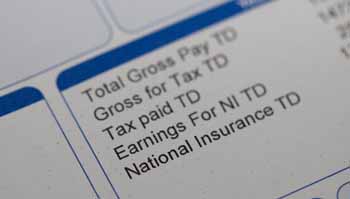Furlough, the National Minimum Wage and maternity allowance
The National Golf Clubs’ Advisory Association (NGCAA) look at financial changes coming in in the next few months which may impact your golf club.
The Coronavirus Job Retention Scheme (furlough) is extended to September 30, 2021
The chancellor announced in his budget on March 3, 2021 that the Coronavirus Job Retention Scheme (CJRS) will continue until September 30, 2021.
The CJRS was due to end on April 30, 2021, but the extension will bring comfort to golf clubs, given that hospitality restrictions are set to run beyond that date. As now, the CJRS continues to cover up to 80 percent of an employee’s pay for the hours they do not work, up to a maximum of £2,500 per month. Employees will receive furlough payments at this level, although the amount that the employer claims from the government will taper off through July, August and September.
At present, employers already pay pension and national insurance contributions, with that set to continue through until September 30, 2021.
Where there will be a change in respect of the CJRS payments will be that from July 1, 2021, the government will contribute 70 percent of pay, with employers having to contribute remaining the remaining 10 percent for the hours not worked (in addition to pension and NICs) to ensure that the employee receives 80 percent.
In August and September 2021, the government will pay 60 percent of pay for the hours not worked, with employers making up the remaining 20 percent, in addition to pension and NICs.
The ability to flexibly furlough will continue as it does now, with any hours worked by employees paid in the normal way.
CJRS will continue whether a person is full-time, part-time, agency, flexible or zero hours.
For periods ending on or before April 30, 2021, employers can claim for employees who were employed on October 30, 2020, as long as the employer has made a PAYE RTI submission to HMRC between March 20, 2020 and October 30, 2020, notifying a payment of earnings for that employee. The employer needs not to have previously claimed for an employee before the October 30, 2020 to claim.
For periods starting on or after May 1, 2021, employers can claim for employees who were employed on March 2, 2021, as long as they have made a PAYE RTI submission to HMRC between March 20, 2020 and March 2, 2021, notifying a payment of earnings for that employee. The employer does not need to have previously claimed for an employee before the March 2, 2021 to claim for periods starting on or after May 1, 2021.

Significant change for National Minimum Wage from April 2021
Each year at around this time, the government sets out the increases for the National Minimum Wage (NMW) and the National Living Wage (NLW). The changes to the various age related bands of NMW and NLW will take effect from April 1, 2021 and are set out below, but there is a significant change this year in that the eligibility for the NLW will apply from age 23 as opposed to age 25 as we had previously. Further change is introduced on record keeping, extending the period from three years to six years for an employer to retain records to establish that they pay workers at a rate at least equal to the NMW.
In summary, the increases are:
- amend the age limits so that workers aged 23 or over will qualify for the NLW rate, rather than the NMW rate
- increase the rate of the NLW for workers who are aged 23 or over from £8.72 to £8.91 per hour
- increase the rate of the NMW for workers who are aged 21 or over (but not yet aged 23) from £8.20 to £8.36 per hour
- increase the rate of the NMW for workers who are aged 18 or over (but not yet aged 21) from £6.45 to £6.56 per hour
- increase the rate of the NMW for workers who are under the age of 18 from £4.55 to £4.62 per hour
- increase the rate for apprentices who qualify from £4.15 to £4.30 per hour
- increase the accommodation offset amount which is applicable where any employer provides a worker with living accommodation from £8.20 to £8.36 for each day that accommodation is provided.

Rates of SMP, SSP, Maternity Allowance etc to be increased in April 2021
From April 12, 2021, the rates for SSP, SMP and other related family leave pay rates are set to increase:
- The standard rate for Statutory Maternity Pay (SMP), ie the rate that applies after the first six weeks of pay at 90 percent of the employee’s normal weekly earnings, will increase from £151.20 to £151.97 per week (or be set at 90 percent of the employee’s weekly earnings if that amount is lower)
- the standard rate for Statutory Adoption Pay (SAP), ie the rate that applies after the first six weeks of pay at 90 percent of the employee’s normal weekly earnings, will increase from £151.20 to £151.97 per week (or be set at 90 percent of the employee’s weekly earnings if that amount is lower)
- the rate for Statutory Paternity Pay and Statutory Shared Parental Pay (SPP and SSPP) will increase from £151.20 to £151.97 per week (or be set at 90 percent of the employee’s weekly earnings if that amount is lower)
- the rate for Statutory Parental Bereavement Pay will increase from £151.20 to £151.97 per week (or be set at 90 percent of the employee’s weekly earnings if that amount is lower)
- the rate for Maternity Allowance (MA) will increase from £151.20 to £151.97 per week (or be set at 90 percent of the individual’s weekly earnings if that amount is lower)
- the rate of Statutory Sick Pay (SSP) will increase from £95.85 to £96.35 per week
- the amount of the weekly lower earnings limit, that applies to National Insurance contributions, below which employees are not entitled to SMP, SPP, SAP, SSPP and SSP (but remain entitled to Maternity Allowance), and which is currently £120, is yet to be confirmed for 2021–2022.
For any further advice on furlough or other legal matters affecting golf clubs, please contact Alistair Smith, CEO of the NGCAA on 01886812943 or office@ngcaa.co.uk.















Let me tell You a sad story ! There are no comments yet, but You can be first one to comment this article.
Write a comment